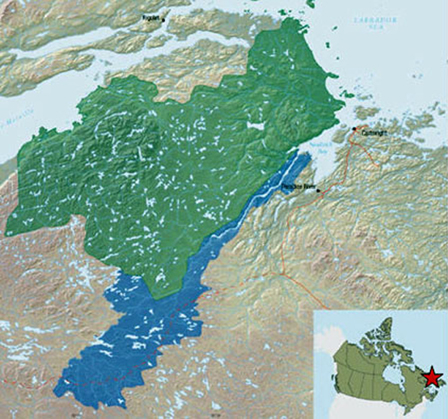This is David, one of Jeff's colleagues at the Boreal Songbird Initiative. Jeff is working limited hours this month, so I might be posting sporadically on his behalf - just introducing myself!
There were two important events we mentioned earlier that happened in Canada's Boreal forest this past month. The first was a report released by us (BSI), the Canadian Boreal Initiative, and the David Suzuki Foundation that compiled all the plant species used by indigenous peoples in Canada's Boreal forest. It showed that indigenous groups in the north still use many traditional plants in their daily life (food, medicine, equipment, housing, etc.) and that governments must do more to preserve these traditional ways of life and the plant species they rely on.
Nancy Turner, a member of the International Boreal Conservation Science Panel and resident ethnobotanical expert (study of the relationship between people and plants) did a radio interview for the show The Link on Radio Canada International to discuss the report.
Here's her interview as an mp3 file. You can click it to play in your default player or right-click to save the file:
![]() Interview >
Interview >
The second big event coming out of the boreal was a wonderful bit of surprising news: the creation of a new national park in Labrador. Mealy Mountains National Park becomes the largest national park in Eastern Canada and is larger than Yellowstone and Yosemite combined. On that same day, the provincial government of Newfoundland and Labrador announced the creation of an adjacent provincial park that protects the Eagle River Watershed. These two parks combine to protect a stagerring 3.2 million acres of important wilderness. These parks are particularly important for preserving the eastern population of the Harlequin Duck, which breeds throughout the region during the summer.
Here's a picture of the Harlequin Duck, a map of the two new parks, and a great article in the New York Times about the parks below that:

Harlequin Duck
Credit: Tom Vezo
Here's a map of the new parks in Labrador - quite impressive!

Credit: Parks Canada
And the NYT article:
Canada to Protect Sprawling Boreal Area in Labrador
By Nathanial Gronewold
2/8/10
NEW YORK -- Canada will establish North America's newest national park in an isolated corner of Labrador, the government announced Friday.
At a press conference in the mining community of Happy Valley-Goose Bay, Canada's environment minister and top officials from the federal government and province of Newfoundland and Labrador announced the planned Mealy Mountains National Park.
The areas includes boreal forest, bogs and tundra and is home to a variety of wildlife, including black bear, moose, red fox and an endangered herd of caribou.
The park will be bigger than Yosemite and Yellowstone National Parks combined, with about 3,800 square miles -- 2.65 million acres -- of land set aside.
"It is fitting that we are working to establish a national park reserve to protect this spectacular boreal landscape for all time, for all Canadians," the Canadian environment minister, Jim Prentice, told reporters. Newfoundland and Labrador's government also says it will establish a new provincial park adjacent to Mealy Mountains to protect an important waterway there.
Both governments also promised to consult closely with aboriginal communities as they move to establish the parks.
Green groups in Canada and the United States hailed the decision.
"This is an outstanding boreal landscape with a rich and diverse ecological and cultural history," said Larry Innes, executive director of the Ottawa-based Canadian Boreal Initiative. "We are very pleased to recognize the achievement of the governments."
Officials at the Pew Environment Group's International Boreal Conservation Campaign said Canada's new Mealy Mountains National Park will be roughly the size of New York's Adirondacks and twice the size of the Everglades. Conserving the Mealy Mountains is important for preserving some of the world's oldest slow-growing boreal forest, the group said.
"This is a great leap forward in efforts to complete the Canadian National Park system," Pew's Steve Kallick said in a release. "Prime Minister Harper's leadership has been critical to the protection of Canada's boreal forest -- considered by scientists to be a top global conservation priority."


